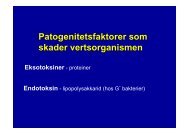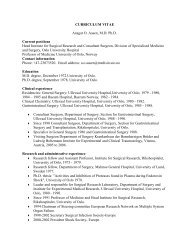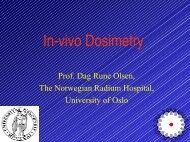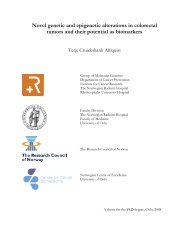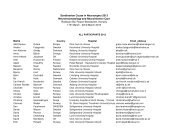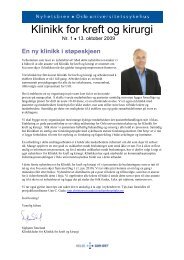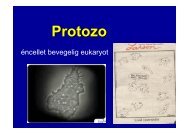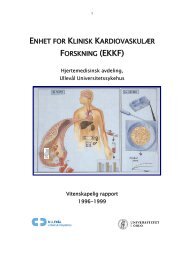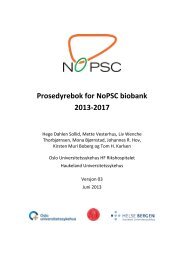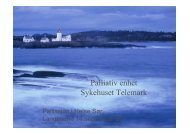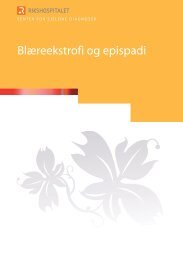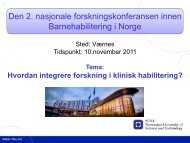Preface - Ous-research.no
Preface - Ous-research.no
Preface - Ous-research.no
You also want an ePaper? Increase the reach of your titles
YUMPU automatically turns print PDFs into web optimized ePapers that Google loves.
Cell Transplantation<br />
toxic effects of immu<strong>no</strong>suppressive drugs (Fig. 2). Important<br />
stress factors for islets include hyperglycemia and islet<br />
hypoxia. Hypoxia is a well-k<strong>no</strong>wn trigger of inflammation,<br />
of which TF, MCP-1, IL-8 and MIF probably are the most<br />
important factors. We have discovered and reported that<br />
the amount of TF expressed on in islets varies considerably<br />
in organ do<strong>no</strong>rs. Recent, we have found a correlation between<br />
the expression of TF and MCP-1 in pancreas biopsies<br />
obtained prior to islet isolation and the clinical outcome of<br />
islet transplantation indicate. Others and we have demonstrated<br />
that a thrombotic/inflammatory reaction is elicited<br />
when islets come in direct contact with blood. This reaction<br />
is termed the instant blood-mediated inflammatory<br />
reaction (IBMIR). In clinical islet transplantation, IBMIR is<br />
triggered within minutes after islet infusion. The detrimental<br />
effects of IBMIR provide an explanation for the need for<br />
islets from 2-4 do<strong>no</strong>rs in order to obtain <strong>no</strong>rmoglycemia in<br />
many transplantation series. The Nordic Network for Clinical<br />
Islet Transplantation recently obtained an NIH grant of $ 10<br />
million to conduct a multi center clinical trial on 72 patients,<br />
with the aim of improving results in islet transplantation by<br />
reducing IBMIR.<br />
Research Plan<br />
The <strong>research</strong> group is focusing on improvements in organ<br />
harvesting, islet isolation techniques, ex vivo manipulation<br />
of islets, and development of large-scale techniques for<br />
islets isolation from other species for potential use in humans.<br />
The overall aim of our experimental and clinical work<br />
is to identify strategies to counteract detrimental effects on<br />
islets prior to engraftment and to improve islet growth and<br />
function post transplantation.<br />
Project 1. Clinical trials<br />
1.1. Open, prospective, controlled study to evaluate the effect of<br />
islet transplantation on quality of life in selected patients with<br />
unstable type 1 diabetes.<br />
It is well established that islet transplantation regularly<br />
induces sustained C-peptide production in type 1 diabetes,<br />
resulting in reduced insulin need and improved metabolic<br />
control. Furthermore, C-peptide production corrects<br />
peripheral insulin insensitivity and the fatty acid profile of<br />
the patients. It has been shown that endoge<strong>no</strong>us C-peptide<br />
improves quality of life of the patients and reduces long<br />
term complications of the disease.<br />
Despite optimal insulin therapy, more than one thousand<br />
type 1 diabetes patients in Norway suffer from unawareness<br />
of hypoglycemia with recurrent episodes of unconsciousness<br />
(Brittle diabetes). These patients have neuroglycopenia<br />
without adrenergic warnings making them completely<br />
disabled by the disease. The incidence of sudden death<br />
is significantly higher than the <strong>no</strong>rmal population. The<br />
<strong>research</strong> group is conducting clinical trial where the goal is<br />
to induce endoge<strong>no</strong>us C-peptide (and <strong>no</strong>t insulin independence).<br />
Patients transplanted with allogeneic islets require<br />
life-long immu<strong>no</strong>suppression (IS). Several of these drugs<br />
may induce diabetes, accelerate atherosclerosis and some<br />
are nephrotoxic. Therefore, the risk of islet transplantation<br />
(and immu<strong>no</strong>suppression) must be balanced to the risk<br />
of having the disease. Sample size (n= 15) is calculated by<br />
improvements in QOL of 30 % with a power of 80 %. Primary<br />
end point is QOL at 12 months. The complete study protocol<br />
is available at http://www.oslo-universitetssykehus.<strong>no</strong><br />
1.2 Open randomized multi-center study to evaluate safety<br />
and efficacy of low molecular weight sulfated dextran in islet<br />
transplantation.<br />
Low molecular weight dextran sulfate (LMW-DS) is a strong<br />
candidate to prevent early islet graft destruction caused by<br />
the instant blood-mediated inflammatory reaction. In addition,<br />
LMW-DS has shown to increase endoge<strong>no</strong>us release<br />
of islet protective hepatocyte growth factor which could be<br />
an additional beneficial effect of LMW-DS during the first<br />
critical hours after transplantation. 72 patients will be recruited<br />
in the study, and 6 patients in Oslo are so far enrolled in<br />
this study.<br />
Project 2. Establishing improved <strong>no</strong>n-diabetogenic immu<strong>no</strong>suppressive<br />
protocols in islet transplantation, able<br />
to induce immune tolerance.<br />
A key factor for success in islet transplantation is said to be<br />
avoidance of steroids as shown by the Edmonton group<br />
in 2000. The IS regimen in the Edmonton protocol consists<br />
of tacrolimus, rapamycin and IL-2 antagonist induction<br />
therapy. Following the publication of the Edmonton group<br />
almost all clinical trials have utilized this type of IS after<br />
the transplantation (although it is well documented that<br />
tacrolimus induces de <strong>no</strong>vo diabetes in up to 25 % of allotransplanted<br />
patients). The aim of project 2 is to identify<br />
an immu<strong>no</strong>suppressive maintenance regimen that inhibits<br />
IBMIR, has minimal islet toxicity and the ability to induce<br />
tolerance. In a step-wise methodological approach different<br />
immu<strong>no</strong>suppressive compounds are screened for diabetogenic<br />
properties and effect on proinflammatory cytokines<br />
(TF, MCP-1).<br />
2.1 Screening of immu<strong>no</strong>suppressants and anti-inflammatory<br />
agents<br />
A selection of compounds is tested regarding their relevance<br />
in clinical and experimental transplantation with special<br />
33



